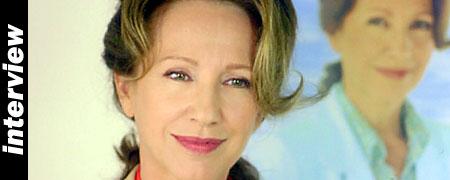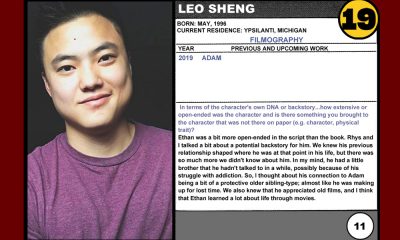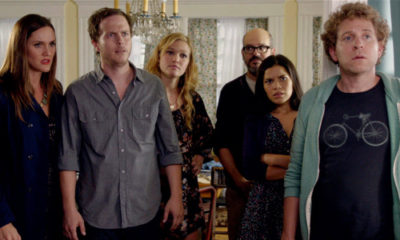Retro IONCINEMA.com
Le Petit Lieutenant: A Conversation with Nathalie Baye
Since 1972 Nathalie Baye has been commanding the attention of cinema audiences around the world by demanding nothing of them. Nothing, that is, except that they watch and listen with the same intense yet gentle concentration she brings to every role.
|
Quick Links |
Since 1972 Nathalie Baye has been commanding the attention of cinema audiences around the world by demanding nothing of them. Nothing, that is, except that they watch and listen with the same intense yet gentle concentration she brings to every role.
In director Xavier Beauvois’s latest film, Le Petit Lieutenant, Ms. Baye plays Inspector Caroline Vaudieu, a recovering alcoholic still grieving after many years over the death of a young son. When Antoine Derouere (Jalil Lespert), a lieutenant just graduated from the police academy, joins Vaudieu’s crime unit in Paris, she assumes the role of his mentor. A richly-textured relationship evolves between the two against the backdrop of a markedly unglamorous world inhabited by workaday cops.
In Le Petit Lieutenant, Beauvois (who also wrote the screenplay with Guillame Breaud, Jean-Eric Troubat, and Cedric Anger) deliberately reveals the drudgery of crime detection. Leads collapse, hunches come to nothing, interrogations go awry, trails of evidence wind into dead ends. Still Inspector Vaudieu and her unit persevere to stalk their prey, a pair of brutish Russian émigrés suspected in a series of stick-ups and homicides. Although many of the exchanges between the unit members count as the as the blandest chitchat —lame jokes, shop talk, locker room musings about women and public airings of family issues—each conversation reveals something about these characters’ inner lives. The very ordinariness of their existence takes on a fascination. In their fears, laments, and ambitions we gradually recognize ourselves and when tragedy befalls one of the officers, the unit’s loss becomes our own. A manhunt turns into a vendetta, not just for Vaudieu and her team, but for the audience as well.

Beauvois’s expert handling of his ensemble cast gives each actor a moment to play at the center of events. There are no star turns in Le Petit Lieutenant, but it is Ms. Baye’s performance that provides the story with an emotional core as well as its context. Early on a colleague refers to her character as a “super cop.” However, as the narrative unfolds we realize this is a misnomer. Ms. Baye’s Vaudieu is utterly human, brilliant and authoritative at work yet superbly flawed with doubts that won’t subside, a profound pain that never surrenders. In a recent interview, the actress and I discussed the film and she revealed how she prepared for the role.
Nathalie Baye

Richard Lally: There is a sense throughout this movie as well as your past work of a character completely in the moment. For example, during your temporary alcoholic lapse, when you’re sitting at the bar ordering that first gin, you’re not doing much outwardly but you seem to be on the precipice of hell…
Nathalie Baye: I think the most important thing for an actor is to work and think a lot before starting the film, to talk to the director, ask all the questions you want and read the script many times. A lot of work before. And then when you are shooting, be completely available from the moment you start the scene. I knew what I was going to do just after the clap, meaning I know perfectly well my character and I trust the scene and I love the script. I am involved with everything. But then you must leave room for the unknown. When I was a younger actress I was full of ideas, you know what I mean? I was going to this and that during a scene or try some other business. It was like showing up with two big suitcases filled with little gadgets. But now I have nothing. I am ready to listen to my director and be completely available. That’s a good word. Open for everything.
For example for that scene in the café. There’s the (crowd) noise around me and the guy going blah, blah, blah next to me and the other people are drinking. This is an atmosphere, something around her, she knows so well. And, in that moment, it’s not possible to do something else but that drink. I didn’t know five minutes before we shot the scene exactly what I was going to do. I just reacted. You know I did two films with Godard. I don’t like all his films, some are boring, some I love but he did teach me something fantastic. When you work with him the script is very simple. You have to be completely empty and ready, you now what I mean? He brought me a lot. I don’t like the idea of “a performance.” I like when it is completely true. Sometimes I see an actor who is very good and I say, “Yes, it’s good what he’s doing, but I see the work.” I try to completely disappear behind the character so you don’t see the work.
RL: That registers particularly in two scenes, when you are in the hospital observing Antoine’s parents and wife as they visit him and when you receive news about his condition. Both times, we cannot see your face, but your body language registers such powerful emotions, you were able to convey so much with just a shrug, people sitting around me were in tears…
NB: I am happy to hear that because you don’t know what people will see when the film is finished. When you are in the scene and into the character and the director has put the camera in a good place, that can happen. If you try to do too much in a scene, try to be too demonstrative, I don’t think that’s good. But if you are absolutely true to the moment, those reactions come normally. But, again, if the director doesn’t have the camera in a place that it can pick up what you’re doing, it’s lost. I’ve been disappointed when I see some films I’ve been in. When you read the script, you imagine one film. Then when you’re filming, you imagine another. And then when you see the film, it’s another version. Sometimes, it’s a good surprise, great! The film you wished for. But sometimes it’s not the film you imagined in a disappointing way. And you might think, “I remember what I did and how we played the scene but the way they shot this, you can’t see any of that.” So the director is very important.

RL: When you and Beauvois discussed this role, what did he tell you?
NB: I had no references for playing a policewoman except from TV and film and that’s not good. And he has spent a lot of time with the police so he could share that. He also had his own problems with alcohol and he helped me with that as well. He made me realize how difficult it is for people with this problem to stop because every day in life some friend is saying, “Hi, let’s go out for a drink,” it’s such a part of society. And you order coffee and have to stare at all those bottles while everyone else is drinking. He fed me all those details I didn’t realize. I like him. It’s simple to work with him because everything he does is true, he does nothing for effect.
RL: Your reference for cops originally came from TV and film and in this film someone makes mention of the way the police are portrayed in those mediums, implying it’s not realistic. This film rejects those super-cop stereotypes. It’s not really a cop film at all but a movie about people who just happen to work for the police department and are coping with life and loss. Was that part of the screenplay’s attraction for you?
NB: Yes, of course. There are three stories. The story of this young man full of ambition and hope. He wants to be a good cop and his future is in front of him. Then there’s this woman, my character, who has lost her son and is a recovering alcoholic and then there’s these people who have wives and children and they’re worried about the things most people with families worry about.
RL: The entire film felt “real,” as if we’re observing life through a window, but some of the scenes had more of an improvisational feel than others? How closely did you adhere to the script?
NB: Most of the time but some scenes were improvised. During the interrogation after the accident, the two characters in that scene asking the questions were real policemen and I had no lines. It was complete improvisation and they conducted their questioning just as they would in real life.
RL: I’ve read that you don’t always like improvisation in films. How did you enjoy working with non-professional in that environment?
NB: At that point I was into the character and I said Xavier, “All right, let’s do it. If it’s good, we can keep it and if it’s not we can try to do something better.”(Laughs) It was like jumping into, oh I don’t know, jumping into something. I was a little anxious because those two guys really know their jobs, it’s what they do. And they were very disappointed because they were attacking this policeman and instead of agreeing with them, I was protecting my guy.

RL: Your character has such a multi-faceted relationship with this young lieutenant. You’re his mentor. At times, he evokes your maternal side. In some scenes, you’re two buddy cops and gender is forgotten. But there were also intermittent sexual sparks between the two characters. Could you sense that as well?
NB: Yes. At one moment we feel as if something can happen between them, at least before the audience realizes she is taking care of this young man because he reminds her of her lost son…
RL: I think all those elements come into play with the scene on the bridge when you’re smoking pot…
NB: At that point, the public doesn’t know she has lost her son, so there is no telling where the scene may lead, which gives it something extra. She is like that with him because he is a young police officer as she once was when she started so she wants to protect him because she knows the dangers. But she’s also thinking, “If my son were still alive, he would be like him.” I was very touched by that scene.
RL: Your director is also an actor in this film and, early on, you worked with Truffaut while he fulfilled the same dual role. What are the advantages and disadvantages of acting with your director?
NB: Since it happened with me and Truffaut in The Green Room and Day for Night, I am a little used to that. It was more difficult with Truffaut especially in The Green Room because we’d be acting together and then, after cut, he’d be up talking to the first assistant and that left me feeling very alone. He was so anxious playing that part, it was a large role, and directing at the same time. But Xavier took a smaller part in this film and the transition from actor to director felt very normal. 80% of the time he was the director only. One thing that was funny: this was the first time I ever walked on a set with a director who was wearing a gun on his belt. I said, “Oh, my god, we all better be on our toes. You have a gun.”
RL: I’ve heard your role was originally intended for a man. Did they do many significant rewrites after you took the part?
NB: Not really. Xavier is a friend because we did another film a few years before. He came to me first with the role of the prosecutor, a much smaller part and I accepted. Meanwhile he was waiting for the other actor, this man, to accept the role of Commander Vaudieu. But it took so long for him to decide that one day Xavier called and said, “I have an idea. You are going to play the part of Vaudieu.” It took me five minutes to roll that around in my mind. I trust Xavier a lot and I like his talent so I said okay. I came to think the idea was absolutely fantastic, not because I got the part, but because the relationship between the commander as a woman and that young lieutenant became stronger and richer.
RL: In the last scene, there is a certain ambiguity to what you’re experiencing as you walk on the beach. You’re grieving, you’re trying to make sense of everything. What was running through your mind?
NB: I got the idea and told Xavier that I wanted to look almost directly into the camera. It was my feeling that if I were walking and looking off far away, it would be like searching for the future. And in my mind, my character’s mind at the time, it was “So here I am. It is finished with this young policeman, like my second son, and now this story is finished and what am I going to do?” That was the question and I wanted to look eye-to-eye with the camera like in an interrogation.
RL: You still divide time between film and the theater and you’re in rehearsal for a play that is about to open in Paris. Do you have a preference between the two?
NB: No. Acting with the camera is great and on the stage it is great but different. One thing I love with theater is the rehearsals. With the movies, when you are shooting a film you must find something immediately. But with the theater, you have those six or eight or ten weeks to find things, it is little by little, and then you still find things after you open. The role keeps growing and changing. It is still moving. And when you’re on stage you have this relationship with the audience that you can’t have in film. But I have no preference. I just love acting.
Cinema Guild released Le Petit Lieutenant in NYC on September 8th.




























